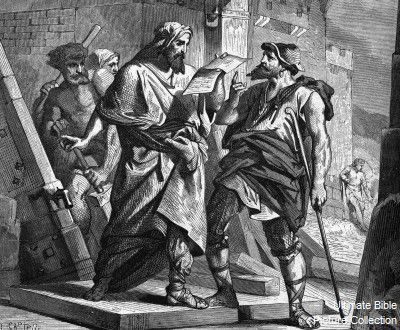
This post continues my earlier notes from David Clines’ discussion of traps biblical historians have often fallen into when reading a biblical text that sounds like an eyewitness, biographical record of historical events — with Nehemiah selected as the case study.
Literary criticism must precede historical presumptions
The lesson for historians to learn, argues Clines, is that literary criticism must precede using the text as a source document for historical information. Only by first ascertaining the nature of the source through literary criticism will we know if and how to read it for other types of information.
When the author is an omniscient narrator
In section 2 of his chapter titled Nehemiah: The Perils of Autobiography, Clines begins
It is a sign of omniscient narrators that they have access to the thoughts and feelings of their characters. The narrators of novels do not need to explain to us how they come to know what people are thinking or what they say to one another in private. Nor do the authors of fictions of any kind. But when authors write as the first-person narrators of their work, we are bound to ask how they come to know what they claim to know. (pp.136-135)
In the Book of Nehemiah there are many times the author writes like an omniscient narrator. He also writes as a first-person narrator, and the effect is to persuade readers that what he says about his character’s feelings and thoughts is true.
Only readers on their guard will be alert to distinguishing between what the author could possibly have known, and what he claims to know. And Clines’ observation is that most biblical commentators and historians have been fooled (“taken in”) by the author’s rhetorical technique and accordingly believe whatever Nehemiah says about Sanballat’s intentions, etc.
Sanballat’s reaction to Nehemiah’s arrival
When Sanballat the Horonite and Tobiah the Ammonite official heard about it, it was very displeasing to them that someone had come to seek the welfare of the sons of Israel. (2.10)
The author does not describe here any observable fact, such as an outwardly hostile reception. Whether or not Sanballat was pleased or not is only something Sanballat could tell us.
But the problem gets murkier.
The author then proceeds to give us the motivation for this particular feeling of Sanballat and Tobiah. This can only be at best speculative.
- Can we imagine Sanballat using these words, or anything like them?
- Can Sanballat have been such a racist, or so blind to his own interests as a governor of a Persian province, that the ‘welfare’ of the citizens of a neighbouring province would have been so displeasing to him?
- Would Sanballat have been thinking that Nehemiah’s work (building the walls of Jerusalem) was “seeking the welfare of the Israelites”? — or is not this rather the language and thought of Nehemiah?
- Would not Sanballat have thought of the inhabitants of Jerusalem and Judea as “Judeans” rather than “Israelites”?
The account is clearly entirely the point of view of Nehemiah about his enemy. It is scarcely “a historical report”.
Now Ezra 4:8-16 does make a claim for some evidence of Samarian hostility against Jerusalem. But the letter is not evidence for Sanballat’s motivations.
Clines asks, even if we grant that Nehemiah is correct in his claim that Sanballat was displeased, what conclusions we are entitled to draw about his motives. He answers: none. There may be many possibilities:
- he might think he has reason to suspect Jewish loyalty to Persia
- he might resent having a royal appointee with direct access to the king as his neighbour
- he might be mistaken about Jewish intentions
As Clines concludes:
Narrators may read minds; but real-life persons, and authors, have to make do with guesswork. Nehemiah as narrator is hardly likely to be a reliable witness to the motives of people he regards as his enemies. But modern historians of the period are so good-natured that they prefer to take Nehemiah’s guesses for truth unless there is evidence to the contrary. Is this a historical method?, I ask. (p.138)
